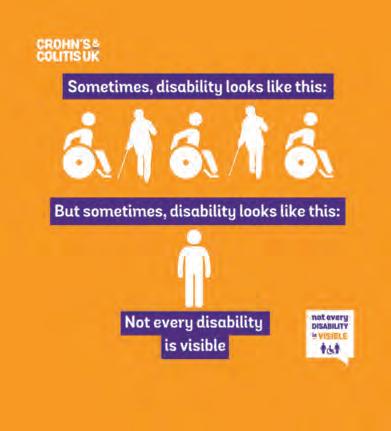
2 minute read
Better together
from Connect Magazine
Shining Light On Hidden Disabilities
Our award-winning Not Every Disability Is Visible (NEDIV) campaign was originally inspired by Grace Warnock, a teenager from Scotland living with Crohn’s Disease, who designed her own accessible toilet signs to help raise awareness of people living with hidden disabilities. Many high street stores, supermarkets, restaurants and travel hubs have come on board in the years since, changing their accessible toilet signs and training staff to understand Crohn’s and Colitis.
NEDIV has made a huge impact, raising awareness that someone can look ‘well’ on the outside and still have a real and urgent need to use an accessible toilet.
Over 83% of people we surveyed in 2019 said they feel more comfortable visiting somewhere the signage is installed. This means our campaign work is really making a difference to people’s everyday lives.
Over the last three decades, our campaigns have effected real change. Recently, It Takes Guts has helped to reduce stigma around the conditions, while Are You IN? is continuing to make workplaces more inclusive. And our newly launched Early Diagnosis campaign is already raising awareness of the symptoms of Crohn’s and Colitis.
Shaping The Future Of Ibd Nursing
We want everyone living in the UK to have access to a suitably qualified IBD Nurse Specialist. We know that IBD Nurse Specialists are working at an advanced level, often running clinics by themselves, prescribing medication, and ordering investigations. But most IBD Nurse Specialists are not educated to MSc level, the level recommended for advanced practice.
So, our Nurse Specialist programme funds and supports nurses to complete an MSc in Advanced Nursing Practice or to credential with the Royal College of Nursing. It also brings them together four times a year to share learning and provide peer support. We now have 27 Crohn’s & Colitis UK Nurse Specialists across the UK and will be recruiting more in 2023.
We’ve also been working with the Royal College of Nursing (RCN) to develop a career framework for IBD Nurse Specialists and have just completed a new audit of the IBD Nurse
Specialist workforce, following on from our last audit in 2019. We look forward to sharing these results.
Pushing For Breakthroughs
The research we fund addresses key areas of importance to people living with IBD. Since 1979, we’ve awarded research grants worth over £12.4m.
We believe it’s vital that the views and experiences of people affected by Crohn’s and Colitis are embedded in all areas of Crohn’s and Colitis research. Since we launched our

Changing Perceptions

We’ve championed toilet access
How We Keep People Connected
At our recent Patient and Public Involvement day, we had: unique attendees researchers taking part
141 9 10
603 8 4 webpage views staff members involved in running the event focus groups live polls
Taking Part in Research Initiative in 2016, over 250 researchers have asked us to help recruit patients to their studies or for help in shaping their research.
The ultimate goal of most of the medical research we fund is to prevent or find a cure for Crohn’s or Colitis. It is likely that there is not a single cure or solution, just as there often does not seem to be a single cause or reason why someone has developed Crohn’s or Colitis.
A Personalised Approach
Biologic medicines are one of the main types of treatment for IBD. But people respond differently to each type of biologic, with some people not responding to any of them. Researchers are working on different ways to predict which biologic will work from the start, avoiding the ‘try it and see’ approach that doctors currently have to take – this is called personalised medicine.
Since 2017 we’ve invested over £500,000 on projects focused on personalised medicine. These studies are looking at a range of different approaches to personalised medicine including developing a blood test to predict response to biologics, and investigating how the microbes in your gut will affect how you respond to medication.










